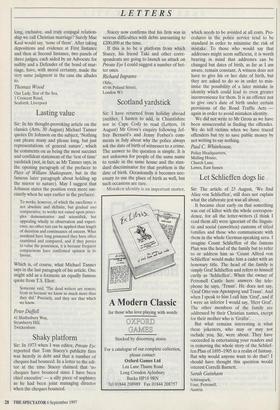Lasting value
Sir: In his thought-provoking article on the classics (Arts, 30 August) Michael Tanner quotes Dr Johnson on the subject, 'Nothing can please many and please long, but just representations of general nature', which he comments on as being the most succinct and confident statement of the 'test of time' yardstick (not, in fact, as Mr Tanner says, in the opening paragraph of the prefaces to Plays of William Shakespeare, but in the famous later paragraph about holding up the mirror to nature). May I suggest that Johnson states the position even more suc- cinctly when he says earlier in the prefaces:
To works, however, of which the excellence iN not absolute and definite, but gradual and comparative; to works not raised upon princi- ples demonstrative and scientifick, but appealing wholly to observation and experi- ence, no other test can be applied than length of duration and continuance of esteem. What mankind have long possessed they have often examined and compared, and if they persist to value the possession, it is because frequent comparisons have confirmed opinion in its favour.
Which is, of course, what Michael Tanner says in the last paragraph of his article. One might add as a footnote an equally famous quote from T.S. Eliot:
Someone said, 'The dead writers are remote from us because we know so much more than they did.' Precisely, and they are that which we know.
Peter Duffel!
41 Shaftesbury Way, Strawberry Hill, Twickenham


























































 Previous page
Previous page